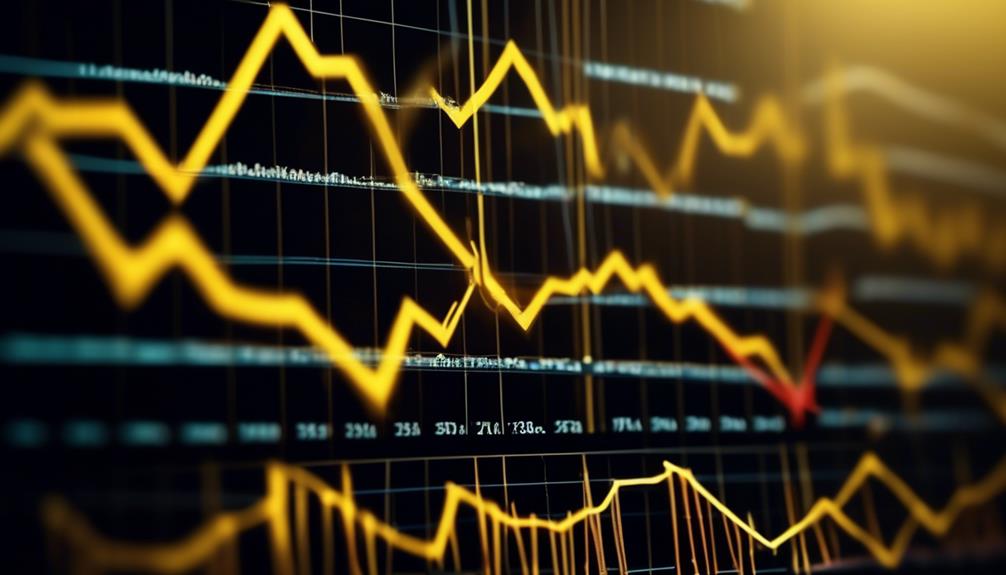Gold Market Vs. Stock Market
Are you tired of feeling like you're walking a financial tightrope, balancing the risks and rewards of the gold and stock markets? It's a precarious position to be in, but understanding the ins and outs of these markets can help you make informed decisions about your investments.
As someone who has spent over 40 years navigating the world of gold and precious metals investing, I know the importance of making well-informed choices for your financial future.
Banks, the monetary system, and politicians have proven themselves to be unreliable time and time again. That's why I believe in having more control over my money, and I want to help you do the same.
By providing the latest updates, information, and trends in the precious metals and gold IRA industries, my goal is to empower you to take charge of your financial well-being.
As seasoned financial experts and economists have pointed out, the gold market offers a unique hedge against economic uncertainties and inflation. This sentiment is echoed by many experienced gold investors who have seen the value of gold hold strong even in the face of market volatility.
With my dedicated efforts, I aim to provide you with reliable, trustworthy, and comprehensive information so that you can make your financial decisions with confidence.
Let's navigate the gold and stock markets together and make informed choices for a secure financial future.
Key Takeaways
- Historical Performance: Gold has been a reliable store of value for centuries, while stocks have shown higher volatility but also greater potential for long-term growth.
- Influencing Factors: Gold prices are influenced by factors such as inflation, currency devaluation, and geopolitical uncertainty, while stock prices are influenced by company performance, economic indicators, and market sentiment.
- Risk-Reward Ratio: Gold is often seen as a hedge against economic instability and inflation, offering lower potential returns but greater stability, while stocks offer higher potential returns but also higher volatility and risk.
- Market Dynamics: The gold market tends to have a more direct relationship with macroeconomic factors, while the stock market is influenced by company-specific and market-wide dynamics.
- Investment Strategies: Investors may consider allocating a portion of their portfolio to gold as a hedge against economic downturns and market volatility, while also investing in stocks for long-term growth potential.
Historical Performance of Gold and Stocks

When looking at the historical performance of gold and stocks, it's important to consider their unique characteristics and potential benefits for investors.
Gold has historically acted as a reliable hedge against market downturns, providing a sense of security during times of economic uncertainty. On the other hand, stocks have generally shown strong long-term growth potential, outperforming gold over extended periods.
According to financial experts, gold has demonstrated an average annual return of 10.2% from 1971 to 2022, making it an attractive option for long-term investment. In 2020, during the COVID-19 pandemic, gold reached an all-time high of nearly $2,075, highlighting its value as a safe haven asset during times of crisis. Factors such as global economic conditions, interest rates, geopolitical tensions, and supply and demand dynamics play a significant role in influencing gold prices.
Conversely, seasoned investors and economists often emphasize the long-term growth potential of stocks. The stock market's performance is influenced by factors such as inflation, interest rates set by the Federal Reserve, and corporate earnings. Over time, stocks have historically outperformed gold, reflecting their potential for strong returns on investment.
It's crucial for investors to understand the historical performance of both gold and stocks in order to make informed decisions about their investment portfolios. By recognizing the unique benefits and risks associated with these asset classes, investors can effectively diversify their holdings and mitigate potential losses during market fluctuations.
Factors Influencing Investment Decisions
In the realm of investment decisions, various influential factors significantly impact the choices made by investors. When it comes to comparing the gold market and the stock market, it's important to consider the factors that influence investment decisions.
Data on gold prices from ICE Data Services reveals that economic conditions, such as inflation and geopolitical tensions, play a crucial role in shaping the price of gold. Additionally, market sentiment and risk appetite also affect the price of gold, making it susceptible to short-term fluctuations.
Gold is often seen as a safe haven during economic uncertainty, a characteristic that contrasts with the performance of the stock market. Investors view gold as an inflation hedge and a long-term store of value, factors that contribute to its appeal in uncertain times. The inverse relationship between gold and the stock market, exemplified by the Dow Jones Industrial Average, further influences investment decisions.
Moreover, supply and demand dynamics, such as mining production and central bank purchases, also impact the price of gold, providing investors with a diverse range of gold investing options, including physical gold, futures contracts, ETFs, gold mining stocks, and gold-related mutual funds.
This information is valuable to investors as it provides insights into the factors that affect the price of gold and the dynamics between the gold market and the stock market. As seasoned investor Warren Buffet once said, 'Gold is a way of going long on fear.' This quote emphasizes the role of gold as a safe haven asset during times of economic turmoil.
Understanding these factors can help investors make informed decisions about their investment portfolios and risk management strategies.
Comparing Risk and Rewards

In times of market ups and downs, investors often weigh the potential gains and risks of gold and stock investments. Gold is considered a safe haven during market downturns, serving as a buffer against falling stock prices. However, unlike stocks and bonds, gold doesn't generate regular income, and its value doesn't always rise, especially during market upswings. Gold's price can be highly volatile, subject to drops, but it can also act as a hedge against inflation and currency fluctuations, reducing overall portfolio volatility.
On the flip side, stocks generally outperform gold over the long term. However, gold has the potential to outperform stocks and bonds during certain shorter periods, particularly during geopolitical uncertainty and high inflation. Historically, in the United States, stocks have had higher average annual returns than gold. Yet, during times of high inflation, gold often thrives as a store of value, driving its price up.
Experts recommend diversifying with both gold and stocks, with suggestions to keep 5% to 10% of investments in gold for portfolio diversification and risk management. This diversification approach is supported by seasoned investors and financial experts who recognize the importance of balancing risk and reward in investment strategies.
Market Dynamics and Trends
The gold and stock markets are influenced by a variety of economic and geopolitical factors that impact investor behavior and asset valuations. Gold has become an increasingly popular safe haven asset, especially during the COVID-19 pandemic. According to data from ICE Data, gold prices have surged during periods of economic uncertainty and market downturns, indicating heightened interest in the precious metal. CBS News Live highlighted that investors turned to gold as a hedge against falling stock prices, underscoring the significance of considering global economic conditions and geopolitical events when assessing gold's performance.
Financial analysts have emphasized the diversification benefits of adding gold to a portfolio, citing its ability to reduce overall portfolio volatility and mitigate risk, particularly during economic uncertainty. It's essential to stay informed about market dynamics and trends when considering investments in physical gold, as the demand and price of gold are influenced by global economic conditions, interest rates, geopolitical tensions, changes in investor sentiment, and supply and demand dynamics.
Renowned financial experts have underscored the importance of monitoring these factors to make informed investment decisions. By referencing these experts, investors can gain valuable insights into the significance of staying updated on market dynamics and trends.
Investment Strategies and Considerations

When it comes to investment strategies, understanding the potential benefits of gold as a hedge against inflation and currency fluctuations is crucial. Gold has a historical reputation as a safe haven during market downturns, potentially offering protection against falling stock prices. Examining the historical performance of gold compared to stocks and bonds can provide valuable insights for making informed investment decisions. Diversifying into various investment avenues such as physical gold, futures contracts, ETFs, gold mining stocks, and gold-related mutual funds can provide portfolio diversification benefits. It's important to assess the potential returns, risk levels, holding periods, and dividend earning characteristics of both gold and stocks to optimize portfolio allocation.
The purpose of this information is to assist and inform readers in formulating investment strategies that take into account the potential benefits of gold as a hedge against inflation and currency fluctuations, especially during market declines. Historical performance and diverse investment options are valuable to consider when making well-informed decisions. Evaluating potential returns, risk levels, and diversification benefits offered by gold and stocks is crucial for optimizing portfolio allocation.
According to renowned financial experts, gold has historically served as a hedge against inflation and currency fluctuations, making it a valuable asset to consider in investment strategies. As legendary investor Warren Buffet once said, 'Gold gets dug out of the ground in Africa, or someplace. Then we melt it down, dig another hole, bury it again and pay people to stand around guarding it. It has no utility. Anyone watching from Mars would be scratching their head.' This perspective underscores the importance of understanding the role of gold as an investment asset and its historical significance in providing stability during market turbulence.
Conclusion
When it comes to deciding between the gold market and the stock market, it's crucial to understand the historical performance, influencing factors, risk-reward ratio, market dynamics, and investment strategies. Both gold and stocks have their pros and cons, and diversifying your portfolio with a mix of both can help manage risk and maximize potential returns. Understanding the unique characteristics of each market is essential for making well-informed investment decisions.
But let's be real here – who really trusts banks, the monetary system, and politicians these days? I certainly don't. I prefer having more control over my money, and I know many others feel the same way. That's why it's important to explore alternative investment options like gold, which can provide a sense of security and independence.
In conclusion, considering the gold market vs. the stock market is a personal decision. It's about finding the right balance of risk and security, and taking control of your financial future. If you want to learn more about investing in gold, request your free gold information kit today and take the first step towards financial empowerment.
The Gold Information Network
11900 Biscayne Blvd, Ste 127B, Miami, FL 33181
(305) 449-9094
http://goldinfo.net
source https://rondewitt.com/gold-market-vs-stock-market/
Comments
Post a Comment